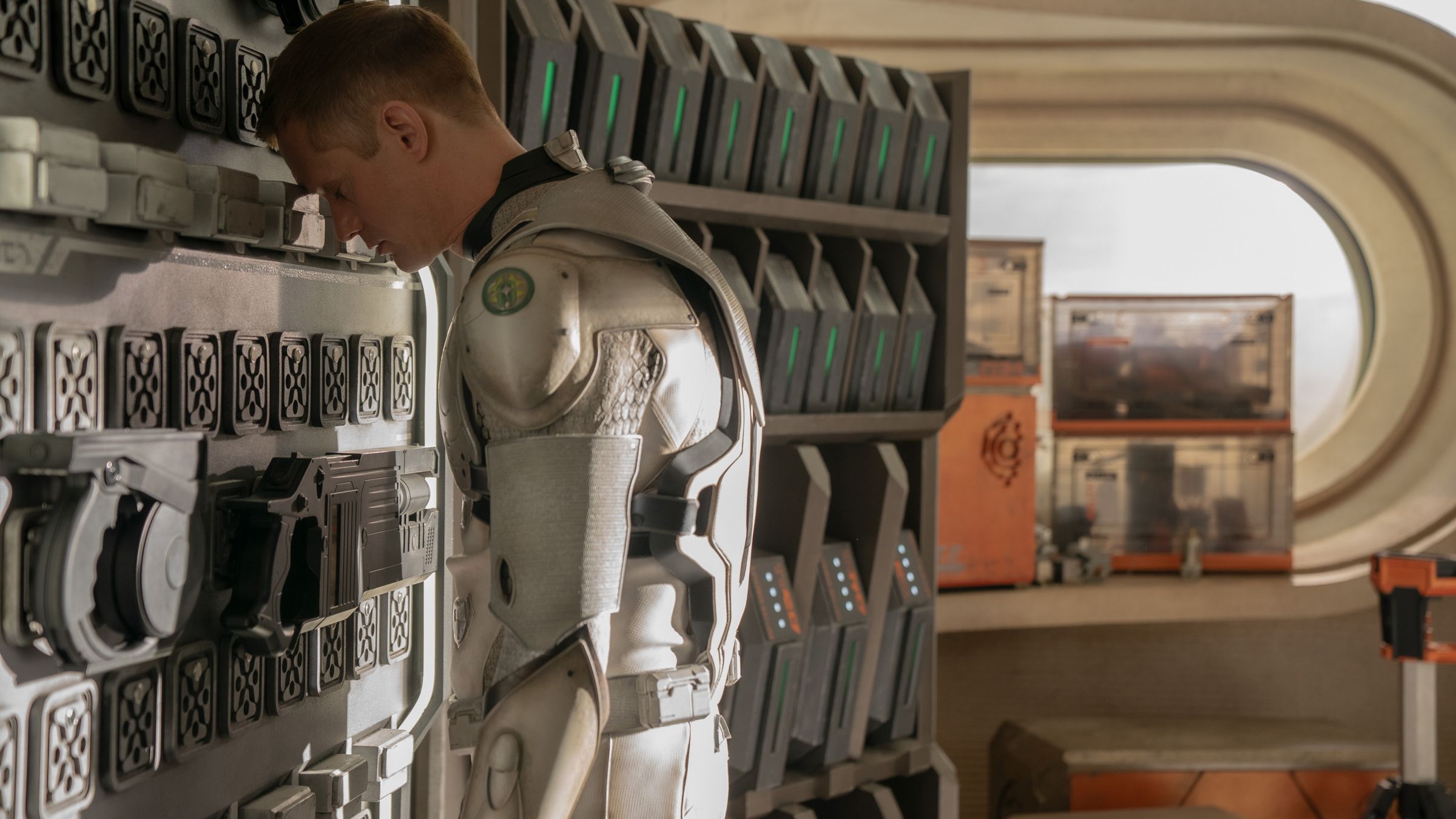All products featured on WIRED are independently selected by our editors. However, we may receive compensation from retailers and/or from purchases of products through these links.
A confession: This dispatch will not be coming to you from one of the long-devout Martha Wells faithful. I’m a convert, a curious reader who turned to Wells’ The Murderbot Diaries series after reading my colleague Meghan Herbst’s fantastic 2024 profile of the author, which left me questioning who would be challenged with taking on the series’ title character in Apple TV+’s adaptation and why it was Alexander Skarsgård.
Put differently, I wanted to know if the actor known for playing blood-sucker Eric Northman in True Blood and a berserker prince in The Northman would be the right fit to play a security robot, or SecUnit, struggling with social awkwardness after hacking his own “governor module” to give himself the freedom to not obey human orders. If the weird affection he forms for the scientists he’s charged with protecting, and the stunted way he goes about showing it, would translate to Murderbot.
After watching the first episodes of the show, which debuts Friday on Apple TV+, I got my answers—and found myself asking a lot more questions. Namely: Why is Skarsgård both so wrong and so right for this role? Why is Mensah (Noma Dumezweni), a cool and confident extraterrestrial expedition leader in the books, anxious and unsure onscreen? Why is her PreservationAux crew portrayed as hippies who seem to have personality quirks instead of personalities? Why does the tone of this thing feel so off?
The rejoinder to any of these boils down to “because TV,” reasoning that’s likely to be Murderbot’s doom and salvation.
Readers love Wells’ books. They’ve won Hugos and Nebulas, the highest praise bestowed on science fiction writing. Read the comments on almost any review of Murderbot’s first season, which closely follows the original Murderbot novella All Systems Red, and you’ll find hand-wringing from loyal fans; they’re hoping the show gets it right. Wells resembles George R.R. Martin or Hugh Howey in that regard. The thing about sci-fi fans is they have opinions—and they’re hard to please.
Not that Murderbot’s flaws lie in pandering. Murderbot (the character) narrates All Systems Red and also the series, and its tone is very specific. (Yes, Murderbot’s pronouns are “it.”) Not to spoil anything—and this piece will remain largely spoiler-free—but it’s a security robot, and interacting with people isn’t its forte. When it finds itself wanting good things for the people who, for once, don’t treat it like a servant, it struggles. It wants to hide that it’s jailbroken itself to gain free will while also acting normal, and in the process either acts very flatly or just repeats dialogue from the hours of streaming content it binge-watches with its newfound freedom (that Murderbot has turned The Rise and Fall of Sanctuary Moon into a show-within-a-show is a plus here).
Murderbot’s narration, both in All Systems Red and its adaptation, gives the story its voice. It’s what people, even though they’re human, identify with. Murderbot does alright with this but fumbles all the other stuff. Characters, like Mensah, like Gurathin (David Dastmalchian), are given tacked-on traits like anxiety or creepiness in an effort to make them well-rounded but often feel disjointed. Polyamory, a matter-of-fact part of life in Wells’ books, gets turned into an unnecessary B-plot, attempting to add drama by pointing out that throuples exist.
Tone, then, becomes the issue. Anyone who read All Systems Red, or any of Wells’ subsequent stories or novels, read Murderbot’s acerbic wit and deadpan observations in their own way, and Skarsgård’s delivery, no matter how good, may not be what they imagined. Every adaptation risks running afoul of reader expectations, but the show’s straightforward plot runs thin at times, and when Murderbot’s narration doesn’t land it just feels flat.
Not that this is Skarsgård’s fault. While some may be asking Why is this unit being played by such an absolute unit?, having a handsome weirdo in the lead was the right move. Ever since his vampire days, Skarsgård has perfected playing bloodless skinjobs. But as Murderbot’s plot ping-pong’s around no one seems to be sure if they’re on a workplace comedy or a sci-fi thriller, making the stakes confused or nonexistent.
Ostensibly, Murderbot is a mystery on two levels. On the first, there’s the PreservationAux crew and their scientific fact-finding mission on a world thought to be relatively innocuous. PreservationAux had to take a SecUnit to get insurance for their mission, and while they don’t trust the corporation from which they got their equipment, including Murderbot, they do need it. It’s only when they get there and discover very bad things that they realize how much. Something has gone wrong on this planet, and Mensah and her crew need to find out why.
Second mystery: Murderbot’s true nature. While it may be struggling to play it cool and not give away the fact that it has hacked its control systems, the crew doesn’t really see it as a threat. Only Gurathin, an augmented human, suspects something is amiss. If anything, they worry about how humanely they should treat it. Slowly, as Murderbot becomes more fascinated with their lives and realizes they’re not the “assholes” it might have thought, they learn to be a team.
Perhaps this is where Murderbot struggles most to find its footing. Each of Wells’ characters was fleshed out, even though they are observed only from Murderbot’s perspective. In Murderbot, they are just as well-rounded, but the show seems preoccupied with their quirkiness—the polycules (cool!), the neuroses. Murderbot never dwelled too much on those parts of their humanity. Murderbot wants, then, to be a quirky sci-fi dramedy with hints of a deeper anti-corporate message—a welcome reprieve on the streaming network most known for big downers like Silo, Foundation, and Severance—but it struggles to be all those things at once.
Midway through the season, Murderbot does shake off some of its clunkiness. As a viewer, you can get used to its wild tonal unevenness. But given the release schedule for the show—two episodes Friday, then one every week until early June—some would-be fans may never get there. In All Systems Red, Murderbot, illustrating its harm-reduction-seeking nature using one of its favorite TV shows, frets “I hate having emotions about reality; I’d much rather have them about Sanctuary Moon.” Viewers may never get there with this show.
Murderbot does, if it’s permitted to, have room to grow. Wells’ story, like all good sci-fi, imagines futures that parallel the present in an attempt to find solutions. At a time when the threat of an artificially intelligent bot taking one’s job feels very real, All Systems Red asks whether creating humanoids to do dirty work is any different from slavery. It questions whether corporations really should be the ones investigating other planets. Topical, but Murderbot’s first season only scratches that surface. Maybe it could find its voice in season two.




